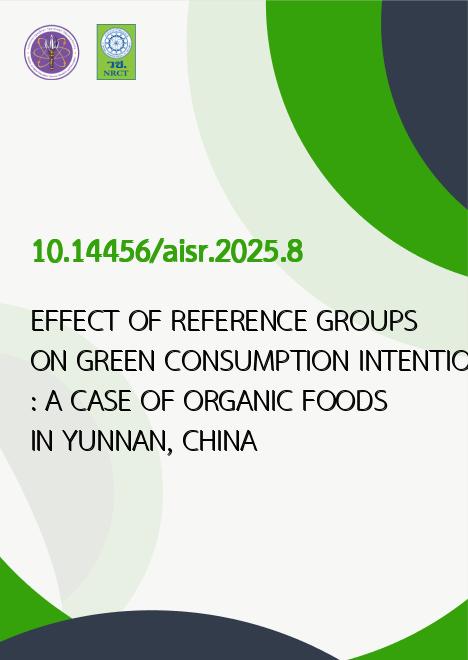
|
EFFECT OF REFERENCE GROUPS ON GREEN CONSUMPTION INTENTION: A CASE OF ORGANIC FOODS IN YUNNAN, CHINA |
|---|---|
| รหัสดีโอไอ | |
| Creator | Jie ZHANG |
| Title | EFFECT OF REFERENCE GROUPS ON GREEN CONSUMPTION INTENTION: A CASE OF ORGANIC FOODS IN YUNNAN, CHINA |
| Contributor | Chanchai BUNCHAPATTANASAKDA |
| Publisher | Asian Interdisciplinary and Sustainability Review |
| Publication Year | 2568 |
| Journal Title | Asian Interdisciplinary and Sustainability Review |
| Journal Vol. | 14 |
| Journal No. | 1 |
| Page no. | Article 8 |
| Keyword | Supply Chain Trust, Green Consumption Intentions, Reference Groups, Organic Food, Product Trust |
| URL Website | https://so05.tci-thaijo.org/index.php/PSAKUIJIR |
| Website title | https://so05.tci-thaijo.org/index.php/PSAKUIJIR/article/view/278663 |
| ISSN | 3027-6535 |
| Abstract | This study provides an in-depth examination of the influence of reference groups on consumers' green purchase intentions for organic food based on the Appraisal-Emotional Response-Coping Theory. By integrating utilitarian and value-expressive reference group influences, the research systematically analyzes the mediating role of product trust and supply chain trust. Additionally, the study investigates gender differences, revealing that value-expressive and utilitarian influences have no significant advantages across genders. This study employed an online survey utilizing a convenience sampling approach to gather data from 433 Chinese adult consumers with prior experience with green product consumption. Structural equation modeling (SEM) validates research hypotheses, uncovering key interdependencies and indirect effects among variables. The study's results emphasize the crucial role of product and chain trust in promoting green purchasing behavior. Value-expressive influence plays a prominent role in shaping consumers' trust and significantly enhances their sense of green consumption intention. Value-expressive and utilitarian influences similarly affect green consumption intention via chain trust and product trust, while the utilitarian influence on green consumption intention was not statistically significant. The practical implications of this study lie in providing strategies for businesses and policymakers to improve chain trust and build consumer trust, thereby promoting sustainable consumption. |
